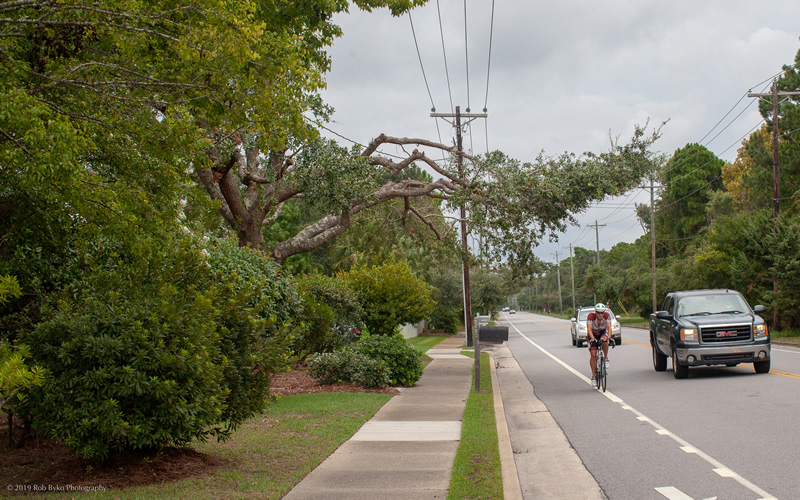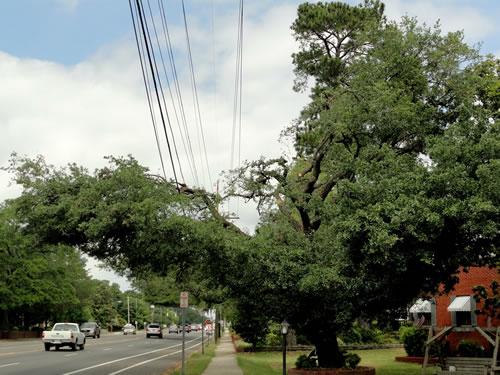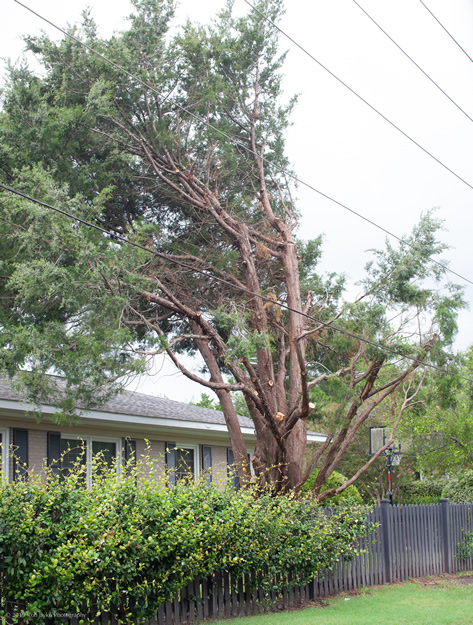By Andy Brack, editor and publisher | The drama over the butchery of trees near power lines is too predictable. It’s time for something to change.
The narrative is, unfortunately, a four-part play:
 Act One: Contracted utility crews show up in a community and start pruning trees to keep limbs from being on top of power lines. If they don’t, they say, then the limbs will fall on lines in storms and interrupt power, which could take days to restore. It’s cheaper to remove the limbs.
Act One: Contracted utility crews show up in a community and start pruning trees to keep limbs from being on top of power lines. If they don’t, they say, then the limbs will fall on lines in storms and interrupt power, which could take days to restore. It’s cheaper to remove the limbs.
Act Two: Neighbors are aghast at how much the crews cut back their trees, sometimes “trimming” branches that are six- or eight-inches in diameter. Some trees are shadows of their former selves, either with big Vs missing from the middle of the tree or looking like they got a half of a Citadel haircut with nothing but nubs and fuzz on one side. Crews say nothing, despite folks who snap photos and try to get a word in edgewise.
Act Three: Neighbors call the media, which do stories about how communities are irked. The power company — it used to be SCE&G and now is Dominion Energy — makes soothing noises to placate neighbors, assuring neighbors that they’re cutting to industry standards (even though neighbors point to repeated examples of how crews went way over the line on many trees). Nevertheless, they mollify and soothe, seeming to speak from a script that tells them to listen, but do little more. (And the script always includes “public safety” because most people don’t want to challenge that concept.)
“We understand and respect the passion our customers have for the iconic beauty of trees across the Lowcountry, we work and live here, too,” Paul Fischer, public affairs specialist with Dominion Energy in North Charleston, told us Friday. “And while we appreciate all of the unique qualities that make each of our communities so special, public safety, as well as the safety of our crews in the field, remains our top priority.”
Act Four: The contracted crews soon are gone. Outraged neighbors seethe for awhile, but do little. Five years later when the crews return to prune again, the drama starts again. And crews generally cut more deeply, leaving worse scars on Charleston communities.
What’s ironic about this whole drama is that Dominion’s slogan is “Actions speak louder.”
Yes, they do. And despite all of the public relations rhetoric, these actions seem to show that contracted crews and the utility, by extension, are going to do what they want, regardless. They’ll soothe and placate, but they’ll keep butchering our neighborhoods.
When asked about a recent report by the city of Charleston that found Dominion’s contractors were not compliant in trimming nine out of 74 trees in West Ashley — what one activist calls a 12 percent failure rate that wouldn’t be acceptable in any business — here’s what Dominion’s Fischer said:
“As reported by other media outlets, the work reviewed by the city of Charleston was found to be overall compliant. According (to) the document released by the city, “some trees were determined to be non-compliant with the standards but were rendered so intentionally and with justifiable reasons.” Those reasons are defined in the report as “stub cuts” or “pruning to an adjacent limb” that will not become dominant. Both instances are designed to yield results that will “lead to a greening of the canopy” and ultimately enhance the aesthetics of the trees. After just a few months, many of the trees reviewed in this report have already begun to return to a more mature appearance.
“Tree trimming cannot be compared to manufacturing, as our work is not accomplished on an assembly line. Certified arborists and contractors in the field, working under a wide range of variables and dynamic conditions, recognize that each tree is different in structure, and our pruning practices take that into consideration. The trimming may or may not look exactly like the previous trim cycle depending on a number of factors including dead or diseased limbs and growth closer to primary wiring than in previous cycles. Consequently, the appearance may also vary from tree to tree once the work is complete. Our business model is comprised of delivering energy in a safe and reliable manner across a variety of environments. What remains constant is our commitment to safety and reliability.”
In the world of public relations, the longer the answer is, the more likely that someone has hit a nerve.
So what’s next? Do communities just repeat the narrative every five years or so?
We urge citizens, environmental stewards and neighborhood associations to contact the state Public Service Commission, which regulates utilities like Dominion, and demand an investigation into how the utility’s crews prune trees and manage the aftermath. Among the queries they can insist upon:
- How are utilities performing, compared to standards, in pruning trees? What percentage of trees are lost or mangled due to improper cuts? How does the cutting impact our communities?
- Are standards reasonable?
- How often do pruners exceed standards?
- What specific, written instructions does the utility give to contractors to deal with customers who don’t want trees cut?
- What specific, public relations strategies, tactics and documents does the utility have to manage inquiries about tree-pruning?
- What measures do pruners take before trees are cut to accommodate customers’ concerns about the severity of cuts? How often are trees cut without customer consideration?
- What do other states do to be more proactive in tree-cutting by utilities? Are there best practices not used in South Carolina, such as requiring a certified, independent arborist to accompany crews whenever cuts are made?
- What programs do states and local governments offer in other jurisdictions to mitigate the impact of cuts? For example, are there programs for governments and homeowners to share the expense of burying power lines, which would eliminate the need for pruning by utilities? (An internet search shows the cost of burying transmission lines can be 10 times to 14 times as expensive as overhead lines and can exceed $1 million per mile.)
We’re sure you can come up with more questions for PSC investigators. The point is if we don’t start doing something differently, nothing is going to change and the trees will continue to be butchered.
Why? Because “actions speak louder” than words.
Andy Brack’s new book, “We Can Do Better, South Carolina,” is now available for $14.99 in paperback via Amazon.
- Have a comment? Send to: editor@charlestoncurrents.com






 We Can Do Better, South Carolina!
We Can Do Better, South Carolina!

























3 Comments